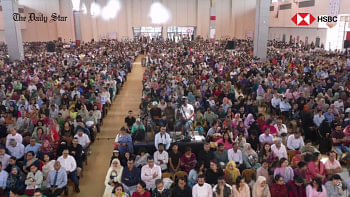Move to control PLCs may foil reform goal in power sector
A move by the power ministry to impose control over the newly created state-owned corporate entities in the power sector may foil the government's long-cherished reform goals.
According to official sources, The Power Division created a consultative committee in April to monitor, control and oversee the activities of the 10 state-owned public limited companies (PLCs).
The committee at a meeting with state minister for power and energy in the chair, decided that either the secretary or additional secretary of the power division will be chairman of each of the PLCs.
Similarly, the PLCs will have to consult with the consultative body prior to taking any decision regarding issues like pay and perks, manpower recruitment, promotion, extension of agreement and house rent fixation.
This decision invoked a huge frustration among the operating boards of the PLCs as they think this would immensely curtail their independence in running the organisations in a commercial manner.
Under a reform programme supported by the donor agencies, the government, by dividing the Power Development Board (PDB) and the now defunct Dhaka Electric Supply Authority (Desa), created a number of public limited companies (PLCs).
The PLCs include Power Grid Companies of Bangladesh (PGCB), Dhaka Power Supply Company Ltd (Desco), Dhaka power Distribution Company Ltd (DPDC), Electricity Generation Company of Bangladesh (EGCB), Ashuganj Power Station Company Ltd (APSC), North-West Power Generation Company Ltd (NWPGC) and the West Zone Power Distribution Company Ltd (WZPDCL).
All the PLCs were registered with the Registrar of the Joint Stock Companies and Firms under the Companies Act 1994.
The main objective behind the creation of the PLCs was to turn them into corporations in the power sector with a view to reducing the system loss, increasing revenue collection, making the PLCs independent, vibrant, profitable and truly commercial organisations.
The PLCs were registered under the Companies Act giving the autonomy to take their own decision independently. Elimination of bureaucracy in the decision making process was another goal.
As part of these goals, shares of PGCB and DESCO were floated to the public through direct enlistment in the stock markets to gradually introduce the private sector management.
From that perspective, so far, PLCs have been running by their own independent management and board of directors. Within a short span of time, significant improvement appeared in performances and services of the PLCs.
For instance, Desco system loss came down to around 10 from 45 percent in last 14 years while PGCB set an example in reducing its system loss and making profits while PDB's system loss still hovers at more than 20 percent.
As a result, when the shares of Desco and PGCB were offloaded to the public through stock market, they received huge response from the investors and became 'blue-chips' within a few months. Now, they are the hot cakes in the share market.
Such tremendous results prompted the government to create more PLCs in the power sector, including EGCB and DPDC.
But now, these PLCs became frightened to receive the new order and control mechanism of the Power Division as it has asked them to consult the consultative body prior to taking any decision regarding management operation.
The private shareholders are also frustrated with the Power Division's move terming the order contradictory to the government's stance.
Referring to Schedule 1 of the Companies Act 1994, they said the law clearly stated that “the business of the company shall be managed by the directors”.
They argued that the Companies Act 1994 was passed by the parliament.
So, any executive order cannot overrule such law.
They said if any government interference comes into being, it would foil the government's long cherished goals regarding the power sector reforms.
As the PLCs are registered under the Companies Act, it has been an obligation that they will always remain free from all kinds of interference from the relevant ministry.
Private shareholders feel that as the PLCs are owned by the government, it should limit its involvement to appointing directors to the boards of the PLCs from time to time, and annually receive the profits and revenues from them.

 For all latest news, follow The Daily Star's Google News channel.
For all latest news, follow The Daily Star's Google News channel. 



Comments